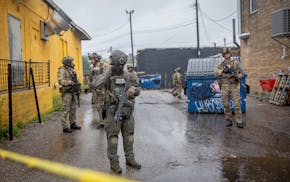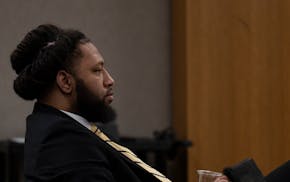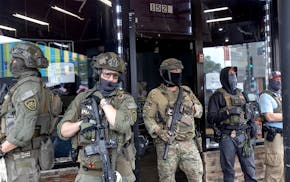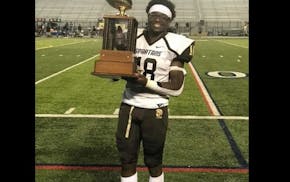Funerals can be dark affairs. But William L. McReavy lightened them.
As the longtime CEO of Washburn-McReavy Funeral Chapels and Cemeteries, McReavy remade dreary funeral homes into bright funeral chapels. He vaulted the ceilings. He added white columns to the entrances. He swapped black hearses for a fleet of white Cadillac coaches.
Under his leadership, the business grew from one funeral chapel in southeast Minneapolis to 17 chapels and four cemeteries, becoming one of the biggest family-run funeral services providers in the country.
"He was a visionary," said his son Bill McReavy Jr., who now leads the family business alongside his sister Cyndi McReavy-Seitz. "He just really could see where he needed to be in the future."
McReavy died at his St. Anthony home on Dec. 23. He was 92.
When McReavy was born, the doctor declared him dead. But his aunt, a nurse, gave him a shot of adrenaline.,
Death was part of his young adulthood, too. His sister Florian died at age 14. His father, Donald R. McReavy died unexpectedly in 1949. McReavy was just 17 then, a senior at Marshall High School in Minneapolis. But he and his mother, Lillian, led the business together.
Studying mortuary science at the University of Minnesota, he sat behind Kathleen "Kay" Hammer in biology. He waited for her outside and asked to walk her to her next class. They had recently celebrated 70 years of marriage.
McReavy's great uncle William P. Washburn founded Washburn Undertakers in 1857, one year before Minnesota became a state, in the days of dirt roads and covered wagons. The original mortuary stood on the corner of Central Avenue and 4th Street SE.
In 1963, under McReavy's leadership, Washburn-McReavy made its first acquisition, expanding into northeast Minneapolis, according to a history of the business. McReavy purchased Swanson Chapel in north Minneapolis a few years later. In 1981, the company acquired competitor Welander-Quist, and five chapels became eight. Washburn-McReavy bought cemeteries, too.
"Little by little, people realized they really liked to work with him and they trusted him," said Kay McReavy, 93. "So when they retired, they'd come to him and ask if they'd consider buying their business.
"And that's how our business grew."
Having multiple locations in one metro area has made Washburn-McReavy the envy of the industry, said Jake Johnson, president and CEO of Johnson Consulting Group, a funeral consulting business. They can share resources, equipment and staff.
While some corporations own multiple funeral homes, there's "something different about private ownership," Johnson said. "Personal touch is a big thing. It's the most personal thing a person goes through."
Because of that, Washburn-McReavy answers their own calls, 24 hours a day, 365 days a year, rather than employing an answering service, Bill McReavy Jr. said. His father took pride in the details, from his hair, combed with Brylcreem, to the chapels' chandeliers, dusted and shined.
When a prominent Minnesotan died, McReavy became the one to call.
In 2001, McReavy's Edina chapel hosted a visitation for Vikings tackle Korey Stringer, who died of heat stroke at age 27. By the visitation's start, more than 1,000 people were waiting, according to a Star Tribune article at the time.
William McReavy pledged that the doors would remain open "until the last fan sees him."
In 2002, early in Joel Maturi's tenure as athletics director at the University of Minnesota, football player Brandon Hall was shot and killed. Maturi met with McReavy, who organized — and paid for — the funeral, Maturi said at McReavy's funeral service earlier this month. McReavy led the fundraising to fly the team to Detroit, where Hall was from, and established a scholarship in his honor.
Maturi and McReavy became close, and became neighbors.
Last spring, still struggling with the loss of his sister, Maturi asked McReavy how he'd managed to comfort so many people. "He responded by saying, just be present, read the room and respond accordingly," Maturi said. "Now that was Bill...
"He was there for others, always knowing what to say, when to say it, and maybe when to say nothing at all."
Washburn-McReavy made headlines in 2020 when McReavy's oldest son, Donald, a Colorado minister, waged a legal battle for his share of the business, a fight that, at the time, industry experts said could threaten its survival. "The McReavy family is a sainted name in this profession," Dan Isard, an Arizona consultant, said then. "They have operated at the highest level of professionalism."
The family "worked together through mediation to come to a mutual agreement," Bill Jr. said this week. (Donald spoke at his father's funeral.)
In 2021, the University of Minnesota honored the McReavys with the Regents Award, noting that the couple "have had a hand in shaping the way Mortuary Science is taught and practiced." The family company has hosted "dozens, if not hundreds, of Mortuary Science students for practicums and internships." The couple started an endowed scholarship, too.
Plus, the U noted, four of Bill and Kay McReavy's children and five of their grandchildren have graduated from the university.
One of those grandsons asked McReavy, in his final minutes, how he was feeling.
"No complaints," McReavy answered. "Thank you, thank you, thank you."
McReavy's survivors also include sisters Arlene Albers and Roxanne Shun, both of Minneapolis; daughter Sandie Shaughnessy of North Carolina; 11 grandsons, and 20 great-grandchildren. Services have been held.

Federal operation at Lake Street restaurant that drew protests was one of 8 across Twin Cities

MPCA intends to yank permit for St. Paul foundry accused of polluting the neighborhood

In surprise testimony, brother says Derrick Thompson was driving in crash that killed 5 Somali women

Their faces covered during Minneapolis raid, federal agents raise privacy worries

